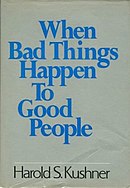 The most innovative scientific and medical breakthroughs come from people who have experienced first hand loss and tragedy.
The most innovative scientific and medical breakthroughs come from people who have experienced first hand loss and tragedy.Stated so well in this 2001 NYTimes article by Lisa Belkin :
But though society may ask, "How could you?" the only question patients and families ask is, "How could we not?"
It is the kind of talk heard with every scientific breakthrough, from the first heart transplant to the first cloned sheep. We talk like this because we are both exhilarated and terrified by what we can do, and we wonder, with each step, whether we have gone too far.
Which is why there is virtually no medical technology yet invented that has not been used. It is human nature to do everything to save a life and just as human to agonize over everything we do. The story of Molly and Henry is the story of groundbreaking science. It is also the story of last-ditch gambles on unproven theories, of laboratory technique cobbled from instinct and desperation, of a determined researcher who sacrificed his job and more trying to help and of a frantic drive through a hurricane to deliver cells on time. In other words, it is simply the story of what it now takes, in the 21st century, to save one child.
When planes crash, elevators fail and space shuttles explode midflight, improved technology and training result, and as more safety features are instituted, a heightened sense of security is provided for the frightened and most times, a longer length of time between fatalities, like 2.5 years and 25 million flights.I always feel safest flying after a crash. I understand the laws of probability.

When people ask WHY something terrible is happening, either to themselves, their loved ones or in a broader sense, to a country, a population, an economy... they should instead be asking,
What will we make of it?
Some people immerse themselves in work. Some write about it. Some people find or renew their faith. Harold Kushner, a Jewish rabbi facing his own child's fatal illness, authored this book,

I think the motivation behind the unhappiness, the sadness, the tragic moment, those feelings of helplessness when someone can't be saved, when you have to let go, when change wasn't your choice...THAT motivation should be the fuel to make a difference, and when met head on with intellect and good faith, becomes the WHY.
It is accepted in many cultures as the principle of yin yang. "... seemingly disjunct or opposing forces are interconnected and interdependent... giving rise to each other in turn."
 "Yin and Yang. One could not exist without the other, for each contains the essence of the other."
"Yin and Yang. One could not exist without the other, for each contains the essence of the other."I'll try to remember that the next time I have a really shitty day.
First I'll pray and wallow, and then I'll go write a love song, or a Pulitzer prize winning novel, or cure cancer.
2 comments:
Thank you - I've had quite a few shitty days lately. Something good always comes out of the bad. Just hard to see at times.
erm... except that the laws of probability say that the percentage is always the same...
for instance:
when you flip a coin it ALWAYS has a 50% chance of being heads, whether or not the last 84 times it came up tails.
Post a Comment